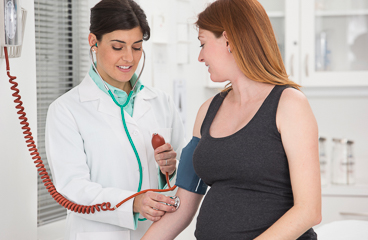
Overview
High blood pressure (hypertension) means that the force of blood against your artery walls is too strong.
High blood pressure problems during pregnancy include:
- Chronic hypertension. This is high blood pressure that starts before pregnancy.
- Gestational hypertension. This is high blood pressure that starts in the second or third trimester of pregnancy.
- Preeclampsia. This is a problem that includes high blood pressure and signs of organ injury during pregnancy. In some cases, it leads to eclampsia. Eclampsia causes seizures.
High blood pressure during pregnancy can affect the amount of oxygen and nutrients your baby receives. This can affect how your baby grows. High blood pressure can also cause other serious problems for both you and your baby. For example, the placenta might separate too early from the wall of the uterus (placental abruption). This can cause serious bleeding or premature birth.
To prevent problems, you and your baby will be watched very closely. You will have to check your blood pressure often during and after the pregnancy.
If your blood pressure rises suddenly or is very high during pregnancy, your doctor may prescribe medicines. They can usually control blood pressure.
If your blood pressure affects your or your baby's health, you may need to be monitored in the hospital. You may get medicines. Or your doctor may need to deliver your baby early.
After your baby is born, your blood pressure will probably improve. But sometimes blood pressure problems continue after birth. If you had high blood pressure during pregnancy, you have more risk of having high blood pressure, heart disease, stroke, kidney disease, and diabetes later in life. Work with your doctor to make heart-healthy lifestyle choices. These include eating healthy foods, being active, staying at a healthy weight, and not smoking. Get the checkups you need. Your doctor may also want you to check your blood pressure at home.
Follow-up care is a key part of your treatment and safety. Be sure to make and go to all appointments, and call your doctor if you are having problems. It's also a good idea to know your test results and keep a list of the medicines you take.
How can you care for yourself at home?
- Take and write down your blood pressure at home if your doctor says to.
- Take your medicines exactly as prescribed. Call your doctor if you think you are having a problem with your medicine.
- Monitor yourself for symptoms of preeclampsia. Call your doctor if you have symptoms such as a severe headache, vision changes, or sudden swelling in your face and hands.
- If you smoke, quit or cut back as much as you can. Smoking and vaping can be harmful to your baby. Talk to your doctor if you need help quitting.
- Talk with your doctor about how much weight gain is healthy for you. Gaining too much weight while you're pregnant may be harmful.
- Eat a variety of healthy foods. Include plenty of foods high in calcium, such as dairy products, almonds, and dark leafy greens.
- If your doctor says it's okay, get regular exercise. Doing things like walking or swimming several times a week can be healthy for you and your baby.
- Try to reduce stress and find time to relax. This is very important if you continue to work or have a busy schedule. It's also important if you have small children at home.
- If your doctor recommends it, keep track of your baby's movement. A common method is to note the length of time it takes to count 10 movements (such as kicks, flutters, or rolls). Call your doctor if you don't feel at least 10 movements in a 2-hour period. Track your baby's movements once each day. Bring this record with you to each prenatal visit.
When should you call for help?
Share this information with your partner or a friend. They can help you watch for warning signs.
Call 911 anytime you think you may need emergency care. For example, call if:
- You passed out (lost consciousness).
- You have a seizure.
- You have trouble breathing.
- You have chest pain.
Call your doctor now or seek immediate medical care if:
- You have symptoms of preeclampsia, such as:
- Sudden swelling of your face, hands, or feet.
- New vision problems (such as dimness, blurring, or seeing spots).
- A severe headache.
- Your blood pressure is very high, such as 160/110 or higher.
- Your blood pressure is higher than your doctor told you it should be, or it rises quickly.
- You have any vaginal bleeding.
- You have new nausea or vomiting.
- You think that you are in labor.
- You have pain in your belly or pelvis.
- You gain weight rapidly.
Where can you learn more?
Go to http://www.healthwise.net/patientEd
Enter A052 in the search box to learn more about "High Blood Pressure in Pregnancy: Care Instructions".
Current as of: July 15, 2025
Author: Ignite Healthwise, LLC Staff
Clinical Review Board
All Ignite Healthwise, LLC education is reviewed by a team that includes physicians, nurses, advanced practitioners, registered dieticians, and other healthcare professionals.

